About me
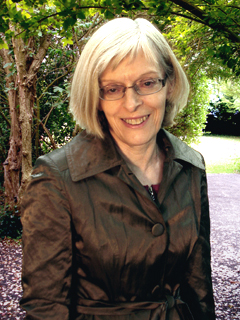
I didn't come to fiction writing until my late forties. When I was younger, writing was nowhere on the agenda. I'd all but forgotten that I'd written as a child, that making up stories was actually what my childhood was about. When I reached my teens, science took me over and put me on course to read physics at Oxford. I went there from a Cardiff council estate in the late sixties, a time and place not particularly auspicious for bumping into girl physicists. Straddling classes and cultures has had its interests and challenges over the years.
A post-graduate degree came next, and then research posts, first in Cambridge, then back in Oxford. But there's a world outside Oxbridge, and I eventually decided to join it. I went into the Whitehall Civil Service. All this meant that I was leaving creative writing farther and farther behind.
For years, briefing Government Ministers and raising a son and daughter meant I was too busy to draw breath, but the need to write must have been simmering. When my daughter was at school, and discovering how you can bring imaginary worlds into being through words, I said to myself, 'Hang on, I used to do that.' Just for the hell of it, I started writing a novel on the train to work, hunched in my seat, scribbling in an A4 pad. Straightaway I was hooked. I typed up my script at weekends, but fitting the novel into an already hectic life made for some exhausting juggling. Fortunately – for me, at any rate – a severance deal came in, with the aim of cutting public sector costs by trimming Civil Service staff numbers, and I was one of the first out through the door. 'Yes, Minister' became 'Goodbye, Minister' and I got stuck into my novel in earnest.
That novel and a number of successors are in box files in the attic, and there those novice efforts will probably stay. Do I regret the decades spent not writing? Not really. I wouldn't have been ready to write at twenty five, say: I needed to spend a bit of time in the real world before I could start creating fictional worlds.
I still live in Oxford, and am still in contact with academe, through my classicist husband and fellow-Cardiffian Chris. Our son and daughter are grown up and married, and I'm now a grandmother.
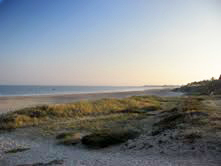
Now and then I like a change of scene. For over twenty years Chris and I have been spending some time every September in France, usually on the Ile de Ré on the Atlantic coast (left), a place that's little more than a sandspit battered by Atlantic gales. Nowhere have we felt closer to the sea, and the sky is a vast bowl with nothing to interrupt the view except the odd church tower and the remains of Vauban's seventeenth century fortifications against the British.
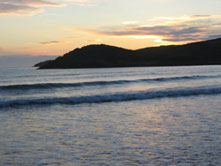 In early summer we also head towards the sea, but nearer home. If there are rocky headlands such as this one (right) near St David's in West Wales, so much the better. I find that these trips are great for getting new angles on current writing projects and finding ideas for new ones.
In early summer we also head towards the sea, but nearer home. If there are rocky headlands such as this one (right) near St David's in West Wales, so much the better. I find that these trips are great for getting new angles on current writing projects and finding ideas for new ones.
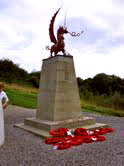
I also like a change of time period as well as of place. Military history is an interest of mine, and Chris and I have visited the Normandy landing beaches and other sites associated with D Day and its aftermath, as well as a number of Great War sites and memorials. The memorial which has stuck with us longest is this Welsh dragon (left). He gazes towards Mametz Wood in Picardy, where 4000 men of the 38th (Welsh) Division died during the First Battle of the Somme. He's rather different from the famous and much-visited Thiepval memorial designed by Lutyens: you reach the dragon down a rough track which winds through farmland. On the day we found him, he was quite alone.
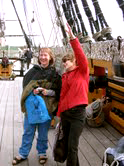
Oxford is not that far from Portsmouth, and I never need much of an excuse to visit the historic dockyard. Here's me (in red jacket) on the quarter deck of the Victory, pointing out to an American friend where the mizzen top of the Redoutable would have been at 1.15 pm on October 21st 1805. Up there was the sharpshooter who fired the fatal shot at Nelson. I have just finished a novel provisionally entitled 'Trafalgar's Other Admiral'. It follows the defeated French Commander-in-Chief, Sylvestre Villeneuve, through several fraught months as a Prisoner of War.
I have two ways of relaxing when I want to switch off. One is to put on headphones and listen to music. My choice of music owes much to BBC Radio 3's Composer of the Week, my favourite radio programme. (Any lover of both music and wide open spaces should try Rautavaara's Concerto for Birds and Orchestra, Cantus Arcticus.)
My other way of winding down is quite different: it's following Formula 1! These days I stick to televised races. Still, there's nothing quite like sitting in the Stowe Grandstands at Silverstone and hearing the roar of engines which signals that the race has started, and any moment now the cars will start barrelling down the Hanger Straight in your direction.
My interests colour what I write, viz. music in Work For Four Hands. The new book, Trafalgar's Other Admiral, draws on my interest in military, and in particular naval, history. The sky or the sea are invariably important, and both drive the plot of A Diamond In The Sky
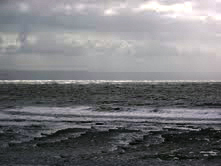
My research for a project invariably takes me wherever the plot is taking the characters. This South Wales beach with the Bristol Channel rolling in (left) features in A Diamond In The Sky. It's not a beach for swimming or sun bathing, it's for lovers of strong winds and shades of grey – in sea and sky, as well as rocks and shingle.
That said, rather than 'writing what I know', I like to write what I'm interested in finding out about. (Many thanks to the friends and acquaintances I've pestered for information on their areas of expertise.)
I've written a number of short stories with widely differing themes, historial and contemporary, for the Oxpens anthologies.
Poems come into my head from time to time, often inspired by places I've visited. Here's one I wrote after a visit to Normandy some years ago. I include it here because it seems to have struck a chord with a number of readers, especially older readers.
Utah Beach
People will forget who won, who lost.
It will take time: Waterloo and Hastings
are still fresh. And Marathon – for
some, that happened yesterday. But
someone yet unborn will hear cicadas
chattering in the marram grass, and not
think of guns. Someone will watch a man
like that one strolling, and not remember
other men who had no time to stroll.
Someone will see the man's son's kite
painting bright green curlicues on the breeze
and not think of parachutes. Someone,
perhaps, in whose blood old enemies
are united.
For now, we who remember stand,
eyes closed, and watch these seaside
colours fade to grainy newsreel grey.
In the museum, a young German stares
at a faded tunic. And here and there,
old men who speak one language
clasp the hands of ghosts.
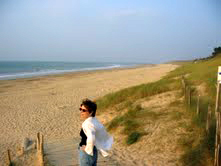 This isn't Utah Beach – I didn't have a good camera with me in Normandy – and there was no-one flying a kite. In fact there was no-one there at all: the sun was setting and the air was growing chilly. But this is the beach which stood in for Utah Beach in the film The Longest Day. It's the Conche des Baleines in the Île de Ré.
This isn't Utah Beach – I didn't have a good camera with me in Normandy – and there was no-one flying a kite. In fact there was no-one there at all: the sun was setting and the air was growing chilly. But this is the beach which stood in for Utah Beach in the film The Longest Day. It's the Conche des Baleines in the Île de Ré.
I'm looking in the direction of Newfoundland. It's as good a place as any to look toward. One day, maybe I'll go there.